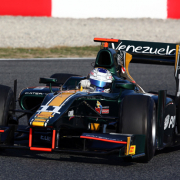Minardi “F1 is going back to ‘90s”
 In less than one week, spotlight will be on the F1 World Championship again, as the new cars which will be the protagonists of the forthcoming racing season, will be soon introduced to the audience. Even the top series has been affected by the economic crisis the whole world is undergoing now, as shown by the fact many seats are still up for grabs. The crisis is also shown by the quit of the HRT Team and the many difficulties expressed by other teams.
In less than one week, spotlight will be on the F1 World Championship again, as the new cars which will be the protagonists of the forthcoming racing season, will be soon introduced to the audience. Even the top series has been affected by the economic crisis the whole world is undergoing now, as shown by the fact many seats are still up for grabs. The crisis is also shown by the quit of the HRT Team and the many difficulties expressed by other teams.
“We’re going back to ‘90s, when the grid was composed by 18 Squads (mostly private), who had to integrate their budget by choosing rich drivers. Starting by saying that if a driver gets the Superlicenza, then he deserves to race in F1, the impossibility to get enough money through sponsorships, forces a team to choose those drivers who can either rely on the support of multinational companies or on the support of countries which use sport to promote their own products and tourism; their choice is not based on sports meritocracy. Teams’ financial situation won’t be better, as the reintroduction of the turbo engine in 2014 will further increase costs.”
 In the last few years, many attempts were made to reduce costs: restrictions and cancellations of private testing and reduction of on-track staff “Strengths have been shifted from one side to the other. Private testing restriction has forced teams to concentrate their resources on new sectors, such as virtual simulation. Moreover, top teams can rely on an in-house team who supports technicians in managing the race. To reduce costs, it should be necessary to have less sophisticated cars, reduce the employment of electronics and aerodynamics and set rules which will help the development of material and technology to be applied on the series production. Anyway, I can hardly understand how costs can be kept under control”, says the manager Gian Carlo Minardi.
In the last few years, many attempts were made to reduce costs: restrictions and cancellations of private testing and reduction of on-track staff “Strengths have been shifted from one side to the other. Private testing restriction has forced teams to concentrate their resources on new sectors, such as virtual simulation. Moreover, top teams can rely on an in-house team who supports technicians in managing the race. To reduce costs, it should be necessary to have less sophisticated cars, reduce the employment of electronics and aerodynamics and set rules which will help the development of material and technology to be applied on the series production. Anyway, I can hardly understand how costs can be kept under control”, says the manager Gian Carlo Minardi.
Car racing has always been one of the most expensive sports ever. Since a long time ago, all the drivers who made it into F1, could rely on the support of their family and important companies. It’s hard to see a driver pushing forward with his own resources. The revolution FIA is carrying on now is aiming at reducing the number of categories in order to make the talent identification process easier. In the past, we had only few categories: F1, F2 and F3. In F2 there were 4 or 5 constructors and more engine suppliers. That was the right way to emphasize talent. We must have the courage to make some steps backwards, even if it’s not easy. The CSAI has made a hard decision: suspend the Italian Formula 3 Championship with the aim of collaborating with Berger and the FIA to achieve a change.”
Few months before the beginning of National Championships, many teams haven’t completed their staff yet and many contracts still have to be signed “By now, GP2, GP3 and WSR teams have many vacancies. The fact that successful teams haven’t completed their staff yet, sounds like an alarm bell. Furthermore, there is another particular circumstance that should be taken under control: many parents are either buying or becoming part of racing teams to assist their sons’ professional development. No doubt this means certainty to some teams, but, if results didn’t come, they could give up. That is what happened when car companies got into F1. As soon as the crisis started to affect the world of car racing, car companies left the scene, causing problems for the entire system.”




